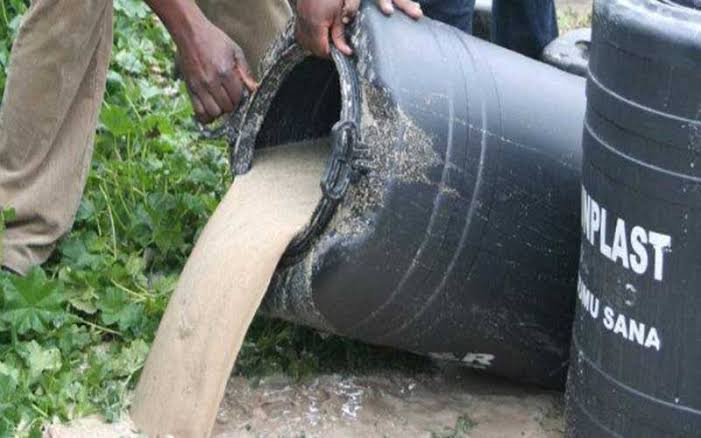KAJIADO, Kenya, Oct 5 – Kitengela town in Kajiado county is said to have at least 2,000 bars, wine, and spirits lounges among other facilities designated as selling alcoholic beverages.
According to a multi-agency team under the rapid response initiative (RRI) program, people selling illegal liquor are now changing tact in a bid to avoid being nabbed as the government intensifies its nationwide crackdown.
According to the multiagency team, in a bid to avoid detection, sellers of illegal brew have resulted in locking revelers inside their facilities particularly past the designated curfew hours.
“We have arrested tens of revelers and bar owners who were drinking second-generation liquor in the wee hours of the morning while locked inside pubs,” Isinya deputy County commissioner Justus Mutua said.
Several pubs were mapped out by the team as selling illegal brews.
The operation is being conducted by Isinya sub-county security officers and offficers from the Kajiado liquor licensing board.
Meanwhile, Kajiado liquor licensing board chairman Jonah Marapash said some of these joints have been identified as drug dens, selling not only illegal liquor but also hard drugs such as bhang among others.
“These people have been targeting teenagers who are now on holiday and this is a great source of concern,” he said.
Routine operations have revealed the sale of illegal brew has now infiltrated residential areas and even shopping centers in the most rural areas. Despite a government directive, liquor and even drugs are even being sold near schools.
The government declared a nationwide crackdown against illicit alcohol and other substances in the build-up to the general election.
Interior Cabinet Secretary Dr. Fred Matiang’i said the intensified campaign that will run for an initial 30 days will target the proliferation of cheap and illegal liquor whose supply and consumption tend to rise sharply towards the general elections.
Addressing Regional and County Commissioners who are expected to spearhead the crackdown in their respective jurisdictions, Dr. Matiang’i said the supply of illegal alcohol, if unchecked, posed serious public health and safety challenges to a system that is already reeling from the strain of the Covid pandemic.
“We have a serious challenge of alcohol abuse aggravated by the season of elections. Some people imagine it is time to provide cheap liquor to enable campaigns. In some cases, this trend is chronic.
“This RRI couldn’t have come at a better time. Let’s go out and wage a vicious campaign,” he said.
The CS who speaking at the Kenya School of Government in Kabete also urged national government administrators to lead by example and warned that those struggling with alcohol and substance addiction will be sacked.
“We must be candid enough to admit we have a problem from within. If you’re a drunken officer who is wobbling in public barazas, how will you implement the RRI? How can you enforce the law when you are supposed to be in a rehab centre?” he posed.
Dr. Matiang’i further cautioned Government officials against abetting the sale of counterfeit and illegal substances and warned that such officers also risked disciplinary action including sacking.
The CS faulted county governments liquor licensing policies saying there was a strong link between their hunger for more revenue from alcohol outlets and the proliferation of trade and consumption of illicit substances.
Speaking at the same function, Interior PS Dr. Karanja Kibicho said the government will put a stop to the cyclic nature of deaths from consumption of illicit alcohol witnessed during the election season by dedicating enough resources to counter the menace.
“Around 30,000 Kenyans died from illegal alcohol or got blind around the last two general elections. This year, we have already lost some Kenyans to illicit alcohol in Nakuru. We will support this initiative with all it takes because we are already seeing attempts to make cheap liquor available,” Dr. Kibicho said.
Want to send us a story? Contact Shahidi News Tel: +254115512797 (Mobile & WhatsApp)


